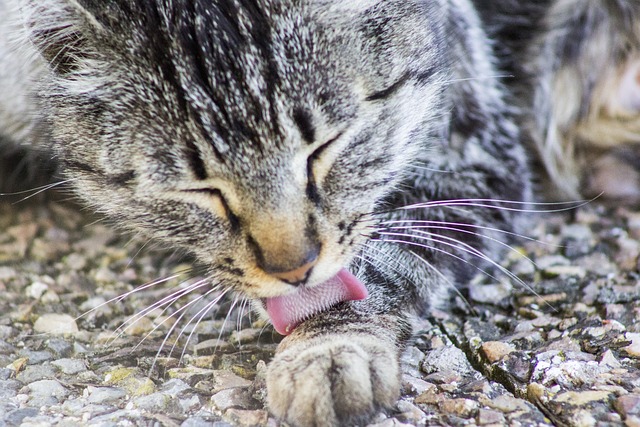

Case Report: Usage of VetStem Cell Therapy for Feline with IBD
Veterinarian: Dr. Heather Streppa of Pet Emergency & Specialty Center of La Mesa, CA
Patient Data
Patient Name: Lovey Harman
Breed: Himalayan
Age: 4 years
Sex: Female Spayed
History
Lovey, a 4-year-old female flame point Himalayan cat, was healthy up to about September 2008 when she had her monthly flea prevention application.
Incident Description
For unknown reasons Lovey reacted negatively to the monthly flea prevention treatment. Her clinical signs were inappetence, emesis and diarrhea. She lost weight rapidly and thus was taken to the specialty center.
Diagnosis
Patient had lost a significant amount of body weight and was dehydrated. Intravenous fluids were started. The differential list of possible causes was lymphoma, IBD and foreign body. Endoscopy was performed to rule out lymphoma and to determine if IBD may be the cause of the symptoms. At this time a feeding tube was placed into the patient and adipose was collected in order to provide autologous stem cells for treatment if appropriate. A total of 26.35 grams of adipose tissue was processed at the VetStem lab yielding 5.44 million stem cells. This was only about 206,000 cells per gram which is considered low. Debilitated animals tend to have lower cells per gram. Pathology results showed no lymphoma but was positive for IBD, so treatment with stem cells was determined to be a viable option.
Treatment Modality Rationale
Inflammatory Bowel Disease (IBD) in cats is a group of idiopathic, chronic gastrointestinal disorders characterized by mucosal inflammation.1,2 IBD is commonly distinguished from food responsive and antibiotic-responsive causes of enteropathy by their response to immunosuppressive therapy as opposed to dietary or antibiotic therapy alone. While the underlying cause of IBD remains unknown, accumulating evidence suggest that intestinal inflammation results from altered interaction between gut microflora and the immune system in the mucosa of the host.3,4
A review of the literature regarding cell-based therapy of Crohn’s Disease and Ulcerative Colitis (the two most prominent of the inflammatory bowel diseases in the human) yields a vast array of animal model and human clinical trials that support the concept of cell therapy of IBD.5-8 T cells in the gut mucosa are considered the primary effector cells and are responsible for the production of cytokines that are responsible for inflammation.4 Mesenchymal stem cells have shown the ability
to migrate to areas of inflammation, down-regulate inflammation, modulate the immune system, stimulate neoangiogenesis, and repair damaged tissues.9
When present in an inflammatory environment, data demonstrates that MSCs may alter the cytokine secretion profile of dendritic cell (DC) subsets and T-cell subsets causing a shift from a proinflammatory environment to an anti-inflammatory or tolerant environment.10 The therapeutic value of stem cell use for IBD is theorized from the animal model and human data available in the literature and the data regarding mechanisms of action of stem cells. A recent report of treatment of IBD in the canine demonstrated a clinical remission in 9/11 dogs with a single IV administration of adipose stem cells.11
Treatment and Outcome
A single dose with a total of 3.2 million stem and regenerative cells were given intravenously approximately 5 days after the endoscopy and placement of the feeding tube.
Within two days of receiving the stem cells the owner removed the feeding tube because the patient was ready to eat. Appetite returned but vomiting and diarrhea did not return. Patient steadily gained her weight back. None of the symptoms recurred. Lovey lived to be 13 years old.
Summary
For most of us, it’s a familiar scenario: A feline patient is brought in with severe symptoms of vomiting, diarrhea and inappetence. With your prompt attention, and proper veterinary care, chances are the patient will get better but may take some time to do this. With a strategic approach and using therapies now available, such as adipose stem cell therapy, one may be able to help speed up the healing process by harnessing the natural immunomodulatory and healing properties of autologous regenerative cells.
This case report demonstrates the therapeutic use of adipose stem cells for IBD in the cat.
References
1. Jergens AE, Moore FM, Haynes JS, et al. Idiopathic inflammatory bowel disease in dogs and
cats: 84 cases (1987-1990). J Am Vet Med Assoc. 1992;201:1603-08.
2. Jergens AE. Inflammatory bowel disease: Current perspectives. Vet Clin North Am Small Anim
Pract. 1999;29:501-21.
3. Chichlowski M, Hale LP. Bacterial-mucusal interactions in inflammatory bowel disease. Am J
Gastrointest Liver Physiol. 2008;295:G1139-G49.
4. Lanzoni G, Roda G, Belluzzi A et al. Inflammatory bowel disease: Moving toward a stem cell based
therapy. World J Gastroenterol. 2008;14(29):4616-26.
5. Portilla F, Alba F, Garcia-Olmo D et al. Expanded allogeneic adipose-derived stem cells
(eASCs) for the treatment of complex perianal fistula in Crohn’s disease: results from a
multicenter phase I/IIa clinical trial. Int J Colorectal Dis. 2012 ;epub September 12, 2012 : DOI
10.1007/s00384-012-1581-9.
6. Garcia-Olmo D, Garcia-Arranz M, Garcia LG et al. Autologous stem cell transplantation for
treatment of rectovaginal fistula in perianal Crohn’s disease: a new cell-based therapy. Int J
Colorectal Dis. 2003 ;18:451–54.
7. Garcia-Olmo D, Garcia-Arranz M, Herreros D et al. A phase I clinical trial of the treatment of
Crohn’s fistula by adipose mesenchymal stem cell transplantation. Dis Colon Rectum.
2005;48:1416–23.
8. Garcia-Olmo D, Herreros D, Pascual I et al. Expanded adipose-derived stem cells for the
treatment of complex perianal fistula: a phase II clinical trial. Dis Colon Rectum. 2009 ;52:79–86.
9. Caplan CI, Dennis JE. Mesenchymal stem cells as trophic mediators. J Cell Bio.
2006;98:1076-84.
10. Aggarwal S, Pittenger MF. Human mesenchymal stem cells modulate allogeneic immune cell
responses. Blood. 2005;105(4):1815-22.
11. Perez-Merino E.M., Uson-Casaus J.M., Zaragosa-Bayle C., et al. Safety and efficacy of allogeneic adipose tissue-derived mesenchymal stem cells for treatment of dogs with inflammatory bowel disease: Clinical and laboratory outcomes. Vet J 2015;206:385-390.




